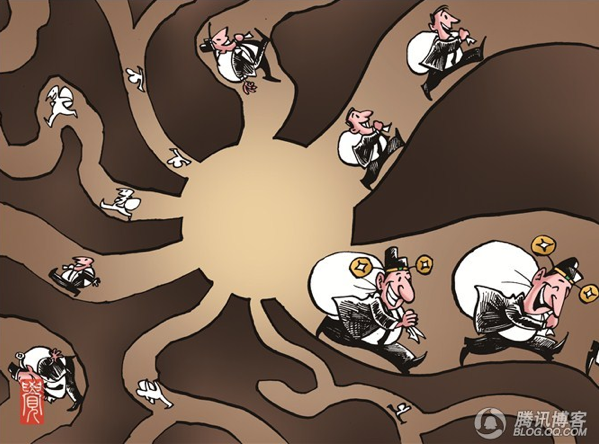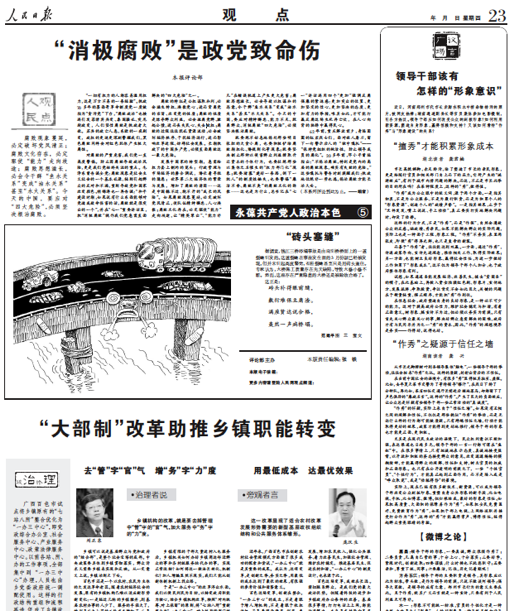In his July 1 speech commemorating the 90th anniversary of the Chinese Communist Party, President Hu Jintao (胡锦涛) paused only briefly from his message of glory and progress to warn that the Party now faces internal challenges that are “more strenuous and pressing than at any point in the past.” Hu said that the Party faces “four dangers” — lost vitality (精神懈怠), insufficient capacity (能力不足), alienation from the people (脱离群众) and rampant corruption (消极腐败).
In one way or another, the last of these, corruption, has been in China’s headlines ever since. Even as celebrations for the anniversary were going on, a scandal was brewing online surrounding the China Red Cross Society, a state-run charity organization. This scandal was set off with callow social media posts by Guo Meimei (郭美美), 20, who flaunted photos of herself and her wealthy lifestyle and claimed to be the “general manager” of a company affiliated with the Red Cross. [3-minute rundown of the scandal at Link TV].
The “Guo Meimei affair,” the facts of which remain frustratingly unclear, has sizzled deep under the surface through July as another story of corruption and incompetence has come to the fore. That story, of course, is all about China’s embattled Ministry of Railways and the country’s monumentally expensive (and apparently rash) push to develop high-speed rail. China’s former railway minister, Liu Zhijun (刘志军), was arrested for corruption in February along with other key figures, including former deputy chief engineer Zhang Shuguang (张曙光), who is reported to have stashed billions of dollars overseas (where his wife and daughter, some say, are now living in comfort). [Here is my latest Link TV 3-minute rundown, of crash coverage in China.]
Thieving state assets and stashing them overseas is clearly a major, major problem for the CCP. But no one seems to know just how big it is — and no one stands by their statistics for very long. However strong the apparent resolve to deal with the issue, it’s just too sensitive to talk about too openly.
Yesterday the overseas edition of China’s official People’s Daily newspaper issued a public apology to “readers at home and overseas”, saying government statistics on corrupt officials absconding with state assets included in a July 26 report were “false.” The original language in the report was as follows:
According to estimates made in the Chinese Academy of Social Sciences report “China Research Report on Countermeasures for the Punishment and Prevention of Corruption” (中国惩治和预防腐败重大对策研究), China presently has more than 4,000 officials who have fled overseas. The Commission for Discipline Inspection says that in the recent 30 years, officials fleeing overseas have run away with more than 50 billion US dollars in assets (about 320 billion yuan), for an average of 100 million yuan in stolen assets per person.
So, were these numbers wrong? Or was the overseas edition of the People’s Daily in the wrong to release them? It is hard to tell whether this apology was actually meant for “readers at home and overseas,” or for Chinese leaders who forced the paper to back-peddle.
This isn’t the first time staggering numbers like this have been revealed. Back in June, Beijing Youth Daily reporter Cheng Jie (程婕) reported that figures released by an enforcement division of China’s central bank showed that since the mid-1990s an estimated 16-18,000 Party, government, police and state-owned enterprise officials from China had absconded overseas with approximately 800 billion yuan in assets, or roughly 123.6 billion US dollars.
The same figures made the front page of the June 15 edition of New Express newspaper, a spin-off of Guangzhou’s Yangcheng Evening News.
The basis for these reports was a document released on the internet by the Anti-Money Laundering Bureau (Security Bureau) of the People’s Bank of China, China’s central bank. The report was called, “Research on the Channels and Detection Methods for the Transfer Overseas of Asset by Corrupt Elements in Our Country” (我国腐败分子向境外转移资产的途径及监测方法研究).
These figures were shared widely on China’s web back in June — just have a look at this Baidu search — and were hotly discussed in social media, as well as becoming fodder for comic artists.

[ABOVE: In this cartoon, posted by the Kunming-based studio Yuan Jiao Man’s Space (圆觉漫时空) to QQ.com, corrupt government officials (identifiable by their imperial-era official hats) hurry through a series of underground tunnels, grinning and making off with bags full of riches.]
For China’s leadership, of course, this issue isn’t at all funny. As Hu stressed in his July 1 speech, corruption is one of the chief dangers facing the legitimacy of the Chinese Communist Party, and one that taps into deep resentment over the way government officials and their family members have — in the eyes of many — benefitted disproportionately from China’s economic development.
And as the scandals involving the railway ministry and the Red Cross Society of China have shown only too clearly, resolving the issue of corruption is fundamental in dealing with Hu Jintao’s danger number three: alienation from the people.
But I would suggest that all of these recent scandals illustrate a fifth danger, one that in various ways is now being debated with deep ambivalence within the Party — and that is lack of openness and transparency.
The need for openness was of course a critical issue in the recent wave of public anger surrounding the July 23 train collision in Wenzhou. But the Party’s hesitancy was illustrated in chiaroscuro on July 28 and 29.
Visiting the site of the crash, Premier Wen Jiabao pledged to get to the bottom of the collision and its causes, holding those responsible to account. But Chinese media had scarcely begun to exploit the opportunity for openness afforded by Wen’s visit before the Central Propaganda Department came down hard.
On the question of openness, contradictions abound.
On August 3, just as Chinese media were reeling from the tightening over the weekend, the official Xinhua News Agency sent out a release called “Central Party Demands Progress of Major Sudden-breaking Incidents Be Announced.” The release dealt with “Opinions Concerning the Deepening of Openness of Government Affairs and Strengthening Service in Government Affairs” (关于深化政务公开加强政务服务的意见), a notice issued by the General Office of the Central Committee of the Chinese Communist Party and the General Office of the State Council.
This “Notice” — I thank Jamie Horsley of Yale’s China Law Center for clarifying this point — has been in the drafting process since 2009 and was worked through various drafts last year before being finalized. But its release on the heels of last week’s public opinion tsunami over the July 23 crash is almost certainly no coincidence.
It’s fair to say that the “Notice” — along with other related moves such as the 2008 legislation on open government information — reflects one school of thinking within the Chinese Communist Party, the idea that openness and accountability are crucial to maintaining legitimacy.
This idea is plainly contradicted by the actions of propaganda authorities, a tug-of-war of priorities not missed by Chinese journalists. He Yanguang (贺延光), a widely respected veteran photojournalist with China Youth Daily, wrote on his Sina Weibo account Wednesday:
I don’t understand! Xinhua News Agency says in an official notice today that there was a need to grasp openness [in the handling] of major sudden-breaking incidents and problems of key concern to the people . . . to thoroughly bring the supervisory role of the media into play, and to strengthen the monitoring [of government] by society . . . Well then, why in recent days have directives prevented media from asking questions and commenting, and made them pull countless pages overnight, so that resentment bristles in the media? Do they up there want to act like whores and build monuments to their chastity? Or is the propaganda department beyond the central Party’s control?
Plenty of Party leaders have argued in recent years that openness of information is a key part of good governance and instrumental to stemming public opinion crises. In 2008, Wang Yang (汪洋), Guangdong’s party secretary, called for greater openness as he likened stifled public opinion to the dangerous “barrier lakes” forming along rivers near the epicenter of the Sichuan earthquake. He said leaders must listen to the words of the people, and not build up “language barrier lakes” (言塞湖) that might threaten to burst (arguably exactly what happened after the July 23 train collision).
But the more farsighted priority of pushing openness to tackle key issues and build legitimacy is most often frustrated in the shortsighted present by the need to maintain social and political stability by enforcing media controls, or “correct guidance of public opinion” (a lesson from June 4, 1989, that the CCP has never forgotten).
In a piece on page 23 of yesterday’s edition of the People’s Daily, we see the tug-of-war at work once again. The editorial, ” Rampant Corruption is a Fatal Wound to the Party” (“消极腐败”是政党致命伤), is the latest piece from the opinion desk of the People’s Daily that penned another group of moderate essays calling for “tolerance” earlier this year.
The editorial is firm in describing corruption as a scourge that must be pulled out by its roots. It is clear that the consequences of not doing so are dire:
Corrupt politics also resulted in mutiny in the Philippines, unrest in Thailand, political change in Tunisia. People firmly believe that corruption is the great enemy of rulers. We are reminded profoundly by the political death of the Soviet Union, and by dramatic transformation overnight and political change in Eastern Europe, that in just the same way black corruption might corrode the red organism [of the CCP].

[ABOVE: Page 23 of yesterday’s People’s Daily, with the editorial on corruption at top.]
But again, this resolve on the issue of corruption is not supported by an equal resolve to be open about corruption, or to be open about the core question of political reform.
Couched in terms of the People’s Daily editorial, this latter question would be: How can the mighty “red organism” transform its own nature?
Not without scrutiny, certainly. Which is why openness — of the press and eventually the political system — is so critical.
The failure to allow open information and debate on key issues like corruption and political reform is therefore a fifth danger facing the Party. In the face of continued controls on China’s press, calls for greater openness like the “Notice” announced by Xinhua, and Wen Jiabao’s pledge to get to the bottom of the July 23 crash, look very much like “openness” behind closed doors.
And that’s unlikely to appease the clawing crowd outside.




















